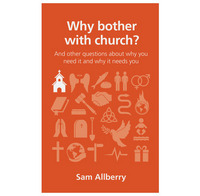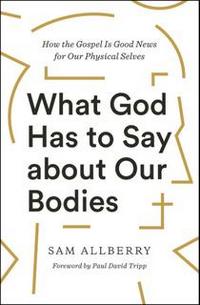 Why bother with church?:
Why bother with church?:
And other questions about
why you need it and why
it needs you
by Sam Allberry
DETAILS: Series: Questions Christians Ask Publisher: Good Book Co. Publication Date: February 12, 2016 Format: Paperback Length: 95 pg. Read Date: February 13, 2022

What’s Why bother with church? About?
Allberry starts with talking about one Sunday walking through a park on his way to his church’s service and how he was tempted to just stay and enjoy the park instead—he didn’t, but it raised the question, why not stay in the park? Why bother with church? Which serves pretty well as an introduction to this short book.
The Table of Contents actually does the best, brief job of telling you what to expect in this book. Sure, it uses 82 pages to answer all these questions, so obviously, none of the answers are too thorough, but they’re all complete enough to give someone a solid start on the ideas presented.
- What is church?
Hasn’t the church done more harm than good? - Why do I need church?
- What makes a good church?
How should I pick a church?
What are baptism and communion for? - How is a church run?
Can’t I view my small group as my church?
Should pastors and elders only be men?
Why are there so many denominations? - How do I survive church?
- How can I be a good church member?
What is the future of the church?
He concludes with an important reminder about what goes on in the church—in both worship and the life beyond the weekly service—pointing to the spiritual realities that are easy to forget.
Highlights
The second level questions appear at the end of the chapter and are a more focused look at something on the chapter’s topic. While I thought Allberry did a decent enough job answering the larger question, these “sub-questions” seem to be a more pressing contemporary question and add good value to the chapter.
The other highlight I’d focus on is Chapter 5, a title that might raise an eyebrow or two. Why would anyone think they need to “survive church”? In this chapter, Allberry tackles the ideas that church can be boring or exhausting (which feel like contradictory ideas unless you’ve actually spent time in a church), which are well and good—and an idea that too few think to tackle. But the best part of the chapter addresses people that have been hurt by the/a church. In too many ways, too many people know that part of church experience. It’s vital that Christians know how to deal with this idea—either for themselves or someone else. I am so glad that Allberry addressed this idea.
Shortcomings
Really, the only thing that stood out was the length—82 pages plus an introduction and conclusion means this is only a primer. For example, the section on “hurt by the church” that I liked so much only gets 12 small-to-medium-sized paragraphs. Which is good, but it’s just a sample of what needs to be said.
I realize that the length of the book is both a strength and a weakness—it’s not intimidating and will be more likely picked up by many than a book that would satisfy this reader. That’s by design, so I don’t hold it against the book, I just find the “sample” length dissatisfying.
So, what did I think about Why bother with church??
Last year, I read The Church: An Introduction and was disappointed with it, thinking it tried to do too much that was beyond an introduction and stumbled most of the time it did that. This was a much better introduction to the idea of The Church. Allberry’s approach was far more approachable, very basic—which doesn’t quite fit that other series. I couldn’t help but think while reading this one that if Allberry’s material was presented with the thoroughness and style of the other one, it’d be a perfect introduction.
That said, given this series’ approach to its topics—very simple, yet careful—or as the publisher describes it, “short, readable books,” this is a great introduction. It covers all the necessary areas in a way that’s clear and understandable by readers from 13 and up (possibly younger). Allberry writes in an easy, conversational tone that’s warm and inviting, you’ll race through the book (possibly requiring deliberate slowing down/rereading).
Is this a book on the topic that I’ll return to? Probably not—I’ll save that for more demanding works. Is this a book on the topic I can give/recommend to anyone looking for something on the idea? Without hesitation.

This post contains an affiliate link. If you purchase from it, I will get a small commission at no additional cost to you. As always, opinions are my own.
![]()




